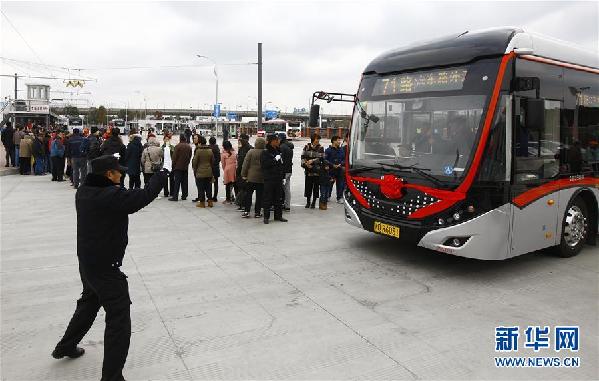Timely service but room for improvement
- By Ni Tao
 0 Comment(s)
0 Comment(s) Print
Print E-mail Shanghai Daily, February 10, 2017
E-mail Shanghai Daily, February 10, 2017
|
|
|
The No. 71 bus service has become quite a sight on Shanghai's roads. [Xinhua] |
The Lunar New Year started with some big news for Shanghai's public transport system.
The new and improved No. 71 bus, which mainly travels along the city's traffic artery, Yan'an Road, hit the road to much fanfare during the Spring Festival holidays.
With a distinct signal system and a lane set aside for its exclusive use, the No. 71 bus service has become quite a sight on Shanghai's roads.
My daily commute involves driving past sections of Yan'an Road, and once in a while I see the No. 71 buses, decked out in silver gray, whoosh past my car and I cannot but marvel at how sleek and posh they look.
Unlike other buses, which have to pull over to the right side of the road to pick up and let off passengers, all but four of the No. 71 bus stops are built underneath the Yan'an Elevated Highway. The glass doors that slide open on the platforms remind passengers that the new bus services are at least partially modeled after the city's Metro system and meant to impress.
Nonetheless, it has been a norm over the years that every improvement made to public services is greeted with plaudits as well as brickbats, and the new bus service is no exception.
In the week after the service was launched, its operator received a great deal of feedback from citizens complaining that the rerouted bus line did little to cut their commute time. So why bother to set a lane aside for a single bus line?
Besides, many citizens are also questioning the wisdom behind a station design that, in their view, makes it inconvenient and unsafe for passengers to access the service.
One of their chief complaints is that getting around motorized traffic and reaching the bus stops beneath the elevated highway requires laboriously ascending and descending the overpass, which takes extra time and makes life harder for senior citizens.
There are even cases of passengers risking their lives jaywalking and climbing over the glass doors into the platform due to unfamiliarity with how the new system works.
Feeling that public criticisms, however mild, may foreshadow the future of a well-meaning measure, the bus operator responded at length to concerns voiced by the public about what they see as a "passenger-unfriendly" system.
The No. 71 bus line, with 25 stops and a length of 17.5 kilometers, traverses downtown districts including Changning, Jingan and Huangpu and ends near the Bund. A complete journey from one end of the line to the other normally requires 75 minutes, but can take longer during rush hour.
Although specially designed and installed traffic signal lights are meant to give the No. 71 bus priority over other vehicles, so as to cut travel time, their effect isn't so self-evident because of extended delays at bus stops.
Chen Jizhou, who oversees the new bus line's operations, explained to Shanghai Observer, a news app affiliated with Jiefang Daily, that delays in passenger pickup and drop-off are largely to blame for the low ratings given to the so-called "priority" signal system.
Right now the bus travels at an average speed of 14.8 kilometers per hour, enabling it to complete the journey in roughly 75 minutes.
Mismatch
This may not be bad in the eyes of operators like Chen, but Yang Xiaoguang, a Tongji University professor and expert on public transport, believes that efforts must be stepped up to upgrade the signal and dispatch system to increase the bus speed to at least 20 kilometers per hour, which he said is the global standard for similar express bus services.
Higher speed, however, is not what the new bus line is primarily about, and the fact that many think otherwise is a result of a mismatch between public expectations and the service's real purpose — to guarantee arrival on time despite the notorious congestion that bogs down traffic during rush hours.
Indeed, I used to be a frequent rider of the No. 71 bus. In the past, buses were left to compete for right of way with more agile and reckless private cars. Near collisions or fender-benders were common. Things were worse during rush hours or when it rained. In what can be described as "Carmaggedon," bus drivers angrily honked their horns but could go nowhere as they got stuck in a so-called bus-only lane that had been encroached upon by personal vehicles.
After a crackdown which began last year on violations of traffic regulations, bus-only lanes were finally returned to buses. And the latest official move of assigning a special express lane for the No. 71 bus is one of many significant achievements witnessed in the city's urban transport system. The next step, it seems, is to make the lane more worthy of its "express" designation.
And more has to be done to make the system sufficiently passenger-friendly to be welcomed by the public. For example, citizens suggest painting arrow signs on sidewalks to point first-time passengers in the direction of bus stations, so they don't get lost or jaywalk.
The criticisms directed at the newly launched bus line are yet another illustration of the necessity for our public service providers to do their jobs with greater foresight and attention to detail.
It can be expected that with the upcoming Lantern Festival, traditionally a time marked by massive inflows of migrants back to town, the No. 71 bus line will face a larger passenger flow — in other words, a bigger challenge.
We'll soon find out how it will cope with the passenger volume surge.






